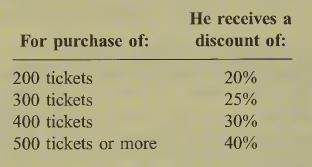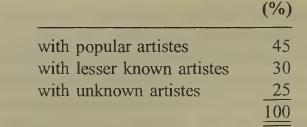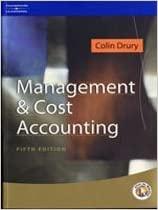Advanced: Output decision based on expected values A ticket agent has an arrangement with a concert hall
Question:
Advanced: Output decision based on expected values A ticket agent has an arrangement with a concert hall that holds pop concerts on 60 nights a year whereby he receives discounts as follows per concert:
Purchases must be in full hundreds. The average price per ticket is £3.
He must decide in advance each year the number of tickets he will purchase. If he has any tickets unsold by the afternoon of the concert he must return them to the box office. If the box office sells any of these he receives 60% of their price.
His sales records over a few years show that for a concert with extremely popular artistes he can be confident of selling 500 tickets, for one with lesser known artistes 350 tickets, and for one with rela¬ tively unknown artistes 200 tickets.
His records also show that 10% of tickets he returns are sold by the box office.
His administration costs incurred in selling tickets are the same per concert irrespective of the popularity of the artistes.
There are two possible scenarios in which his sales records can be viewed:
Scenario 1: that, on average, he can expect concerts with lesser known artistes Scenario 2: that the frequency of concerts will be:
You are required to calculate:
A. separately for each of Scenarios 1 and 2:
(a) the expected demand for tickets per concert;
(b) (i) the level of his purchases of tickets per concert that will give him the largest profit over a long period of time;
(ii) the profit per concert that this level of purchases of tickets will yield;
B. for Scenario 2 only: the maximum sum per annum that the ticket agent should pay to a pop concert specialist for 100% correct predictions as to the likely success of each concert.
Step by Step Answer:






